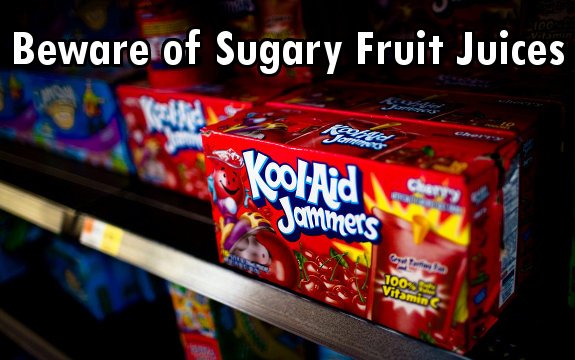‘Healthful’ Fruit Juice may Have more Sugar than Soda

 When you are thirsty, nothing can come close to satisfying the desert in your mouth like water. But for millions, water is a secondary choice, behind things like soda, coffee, fruit juice, and juice-like products. Well, a new study published in the journal Nutrition once again calls those drinkers to task—pointing out that juice contains as much if not more sugar than soda, suggesting that neither are healthful options.
When you are thirsty, nothing can come close to satisfying the desert in your mouth like water. But for millions, water is a secondary choice, behind things like soda, coffee, fruit juice, and juice-like products. Well, a new study published in the journal Nutrition once again calls those drinkers to task—pointing out that juice contains as much if not more sugar than soda, suggesting that neither are healthful options.
According to the research, fruit juice has an average concentration of 45.5 grams of fructose per liter of beverage. Sodas have only slightly more, at 50 grams per liter. But even then, there are some juices that carry more than the average soda.
Minute Maid 100% Apple Juice contains a fructose concentration of 65.8 grams. It, by far, has the most fructose of any of the juices measured. It also has more than Pepsi (65.7), Dr. Pepper (61.4), Coca-Cola (62.5) and Arizona Iced Tea with Lemon Flavor (59.3). At the top of the scale, you’ll find Mountain Dew with 72.3 grams of fructose per liter.
“The human body isn’t designed to process this form of sugar at such high levels,” said lead study author Michael Goran said in a statement. “Unlike glucose, which serves as fuel for the body, fructose is processed almost entirely in the liver where it is converted to fat, which increases risk for diabetes, cardiovascular disease and liver disease.”
Goran elected to measure fructose in response to growing research that suggests it is even riskier than glucose. But his rationale is not accepted by all. Others like Fred Brouns at Maastricht University in the Netherlands, says rather than focusing solely on fructose or glucose, sugar consumption as a whole needs to be analyzed.
Either way, both fruit juice and soda are loaded with the sweet stuff. And while a portion of the sugar found in fruit juices are naturally occurring, added sugars are often present. Either way, though, consuming too much sugar has been shown to increase your chances of developing numerous diseases, including obesity, diabetes, cancer, and much more.
“I think 100 percent fruit juice is as bad as sugar-sweetened beverages for its effects on our health,” said Barry Popkin, another researcher who focused on obesity and nutrition at the University of North Carolina Chapel Hill.
But these researchers can’t deny that fruits themselves have many redeemable qualities, a case where the parts of the whole must be looked at for their synergistic effects.
Still, the solution, Goran says, is to watch labels and to dilute any fruit juice with 50 percent water.
